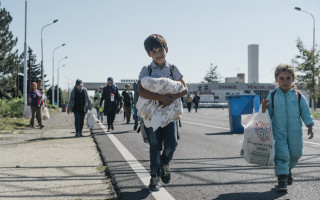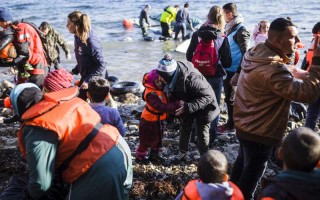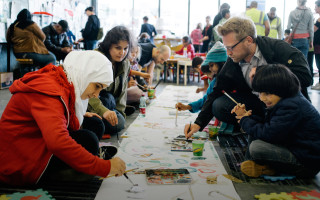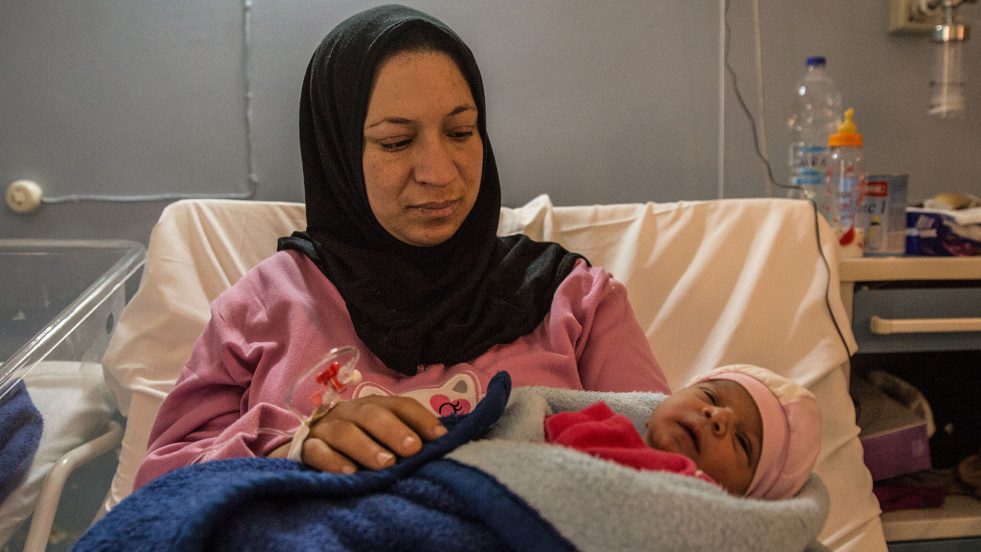
Ahlam rests with baby Samar hours after giving birth. UNHCR/Hereward Holland
Samar Alzayadi’s age is counted in hours. Yet she’s endured more than most people will in a lifetime. She also has the dubious distinction to have been born the millionth refugee or migrant to arrive in Europe by sea in 2015.
Lying in her hospital bed, Ahlam, Samar’s 30-year-old mother, relates the colourful prologue to her daughter’s short life.
Eleven days prior to her birth, Ahlam began her odyssey from Beirut, Lebanon, with her sights set on a new life in Germany, where she has relatives.
“I made the journey because I’ve seen a lot of bad things. I’ve had a lot of bad days and I decided to take the risk to make sure I don’t have any more,” she says.
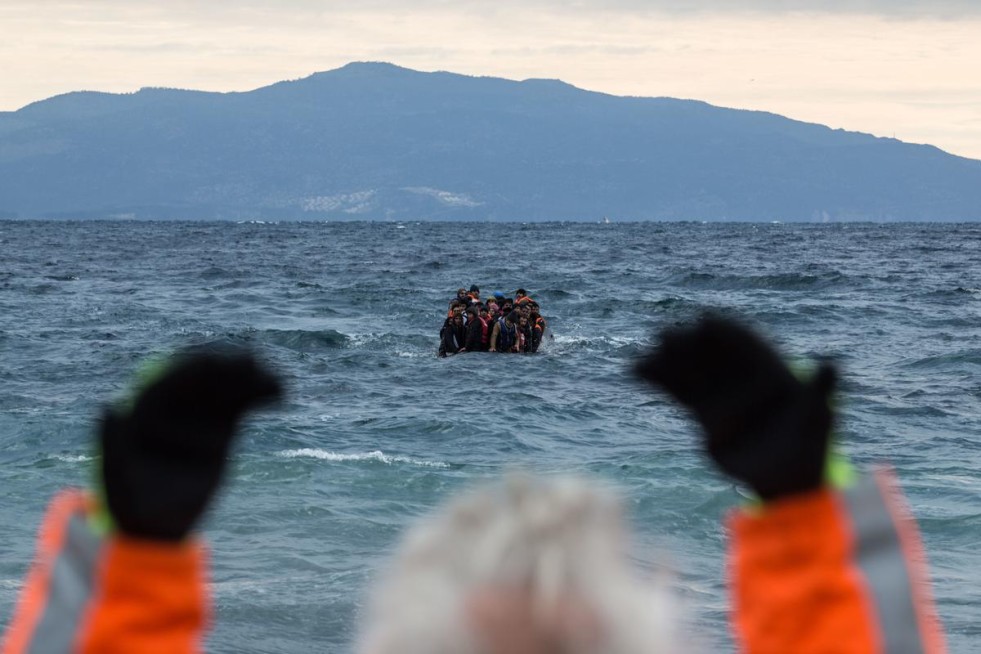
A volunteer beckons to a boatload of refugees arrives at the Greek island of Lesvos. UNHCR/Hereward Holland
On 19 December 2015, heavily pregnant, Ahlam waved goodbye to her husband, Wasim, who was unable to scrape together enough money for his own journey. She would travel alone, with their six-year-old daughter, Saher.
Wasim was shot in the leg in 2011, in their war-ravaged hometown of Idlib, Syria.
The family fled to Beirut, where Wasim worked as a manual labourer for four years, but recently the nerve in his damaged leg snapped and he was forced to stop work.
“We couldn’t afford to stay in Lebanon any more, and we couldn’t return to Syria because of the war. There was no choice for us,” Ahlam says, cradling the swaddled Samar in her hospital bed.
Ahlam’s financial troubles are shared by hundreds of thousands of refugees in Lebanon. Five years after the Syrian crisis started, refugees’ savings are exhausted, valuables have been sold off, and their ability to find work has diminished, while the humanitarian assistance has dwindled because of a shortfall in funding.
“There was no choice for us.”
Lebanon is a small country hosting over a million Syrian refugees—one refugee for every four citizens. It is estimated that 90 per cent of those refugees were in deepening debt and that 70 per cent were living below the national poverty line in 2015, up from 50 per cent a year earlier.
By comparison, Europe has just one refugee or migrant for every 500 citizens even after allowing for the influx in 2015 of up to 1 million people seeking refuge from war and persecution.
Ahlam set off with Saher overland through Syria, her troubled homeland, and headed north.
The journey took two days. They slept on the side of the road and eventually reached the Turkish border, which they crossed on foot, walking and running for three hours.
“I was very tired and we were very afraid,” Ahlam says. “It was like cat and mouse with the police. We were hiding, sometimes running. I wanted to die, all the time. I was carrying two bags and holding my daughter’s hand.”
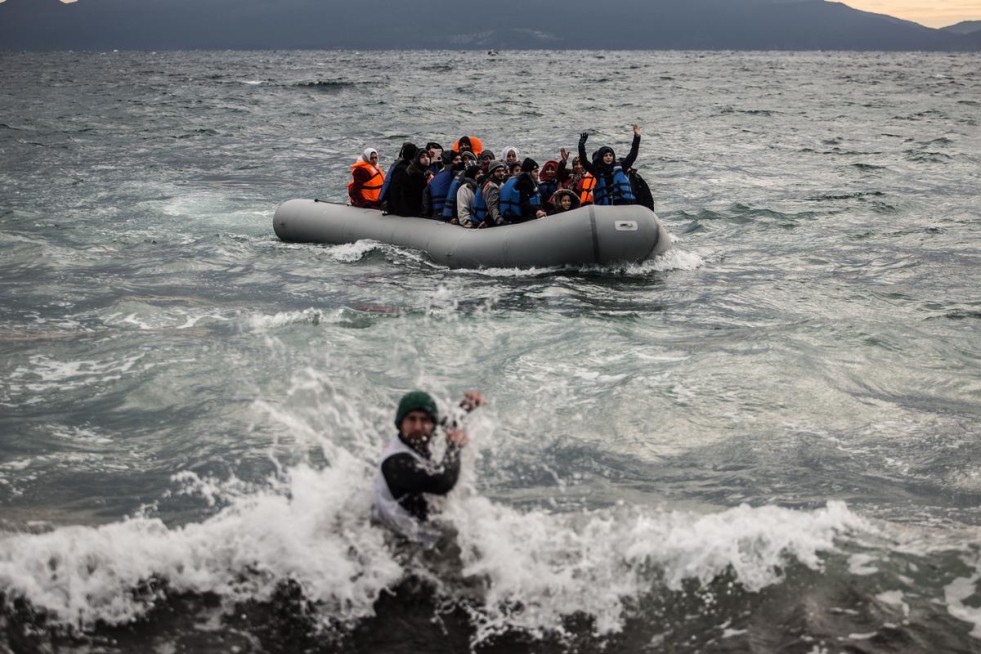
A volunteer battles the waves as a boatload of refugees arrives at the Greek island of Lesvos. UNHCR/Hereward Holland
They took a 17-hour bus ride across Turkey, finishing up in the coastal town of Izmir.
In 2015, more than 10 people died or went missing on average every day while attempting to cross the Mediterranean to Europe.
An overwhelming majority were fleeing war and persecution. More than 80 per cent of those who survived the crossing came from the world’s top refugee-producing countries.
“We heard a lot about the shipwrecks. Everybody worries about that,” Ahlam says.
Nervous but undaunted, and without other legal options to reach safety, Ahlam made contact with smugglers who stuffed the pair into a small inflatable dinghy with 43 other people and, at 4:30 in the morning, launched them into the darkness.
“We heard a lot about the shipwrecks. Everybody worries about that.”
“It was my first time in a boat. I couldn’t see anything,” she says.
Her daughter Samer tucked herself into a ball and said nothing for the 3.5 hours it took to cross the small stretch of sea between Turkey and the Greek island of Lesvos.
“We thought we would drown, all the time. We didn’t think we would make it.”
Her boat bumped safely against European shores at 08:15 on 29 December, and was received by volunteers, aid agencies and UNHCR staff, who helped passengers out of their wet clothes, proffered cups of tea and helped them onto a bus.
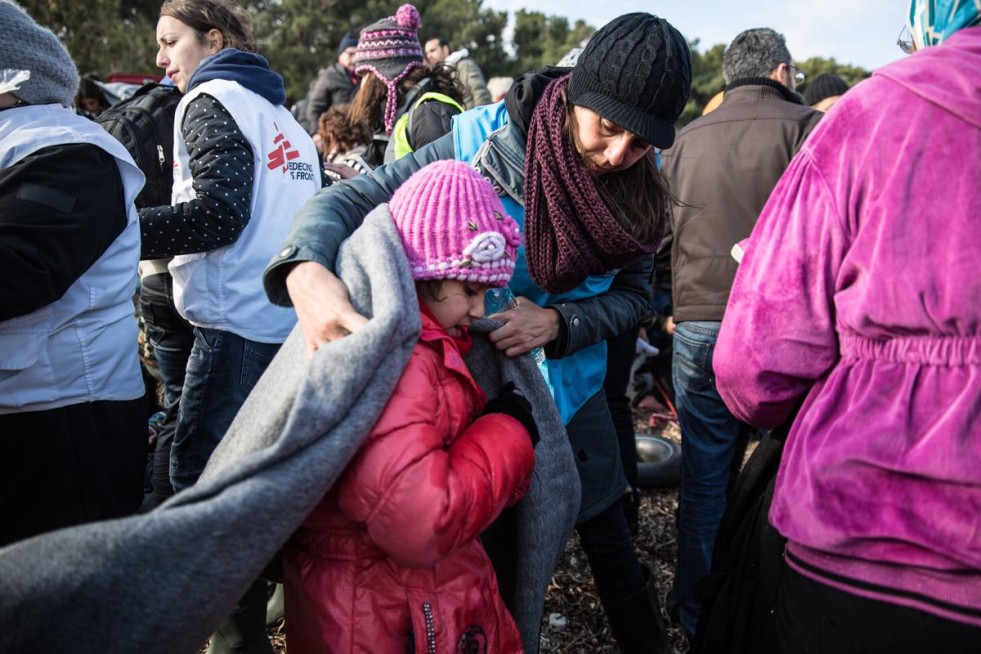
A UNHCR staff member wraps a cold and wet refugee child in a blanket. This group of refugees have just arrived on the Greek island of Lesbos after crossing the short stretch of sea from Turkey. UNHCR/Hereward Holland
Shirlene Afshar, a UNHCR field protection officer, was on duty that day.
“She looked totally calm and cool, but I noticed that she looked very pregnant, in her last trimester” Shirlene says.
Nonetheless, Ahlam’s cool head belied a major problem: The baby was upside down and would require a caesarian section. UNHCR fast-tracked Ahlam’s registration with authorities and quickly transferred her to hospital, where she gave birth to a baby girl at 15:00.
“The first thing was I wanted to tell my husband I had arrived so I messaged him on WhatsApp,” Ahlam says, referring to the mobile messaging service that refugees often use to share information across countries and continents.
“I sent him a photo of my new daughter today.”
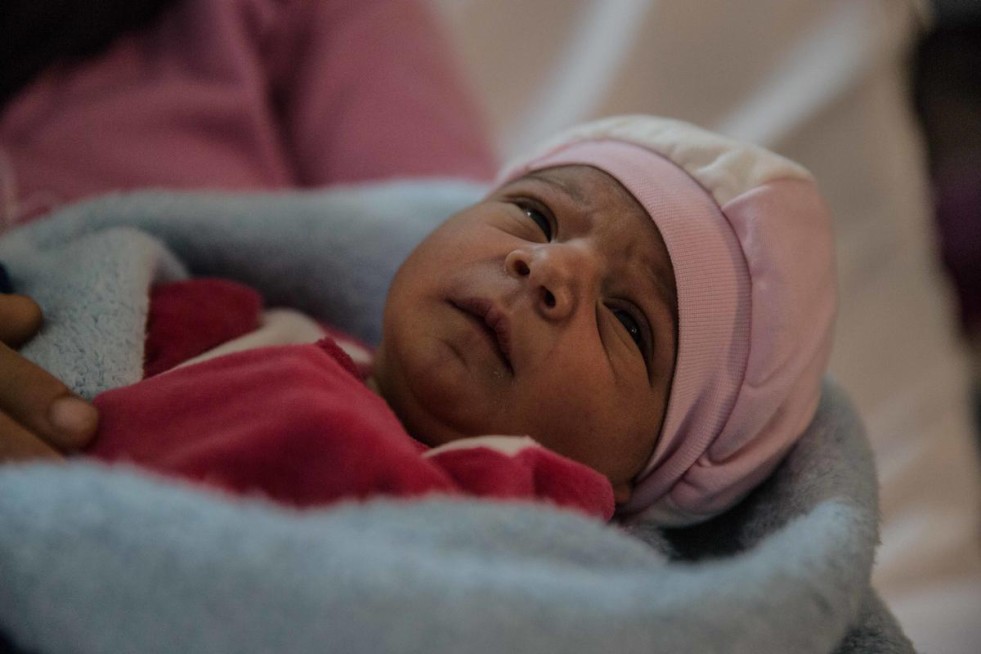
Samar was born just hours after her mother landed in Lesvos, after crossing the narrow stretch of sea between Turkey and Greece. UNHCR/Hereward Holland
The number of people displaced by war and conflict is currently the highest seen in Western and Central Europe since the Balkan crisis of the 1990s.
Ahlam, Samer and baby Samar are amongst the small clutch of arrivals who can claim to be the millionth to reach European shores this year.
The number of people crossing the Mediterranean increased steadily from around 5,500 in January to reach a monthly peak in October of over 221,000.
But with conflict raging across large portions of the Middle East and beyond, and little being done to facilitate legal avenues to reach Europe, UNHCR fears more people will take similar risks in 2016.
Ahlam hopes that one day her husband can join her and their new child in Europe.
“Family reunification must become a reality for more people.”
“The UN Refugee Agency calls on the EU to expand the legal pathways for refugees to arrive safely, instead of risking their lives at the hands of unscrupulous smugglers and human traffickers. Family reunification must become a reality for more people,” says Boris Cheshirkov, UNHCR spokesperson on Lesvos island.
“In the past five years, the rate of displacement has quadrupled globally, and we worry this trend may continue.”
Samar’s eyes flicker open, and her mother looks down proudly. They now have a plan for the future, but the journey is far from over.
“I want to rest for a few days and then continue my journey. God willing, the future will be better because there is no war,” says Ahlam.
“In Syria it would have been very difficult for my new baby to grow up. There would be no hope for her. Life begins here.”
Photos and text by: Hereward Holland
